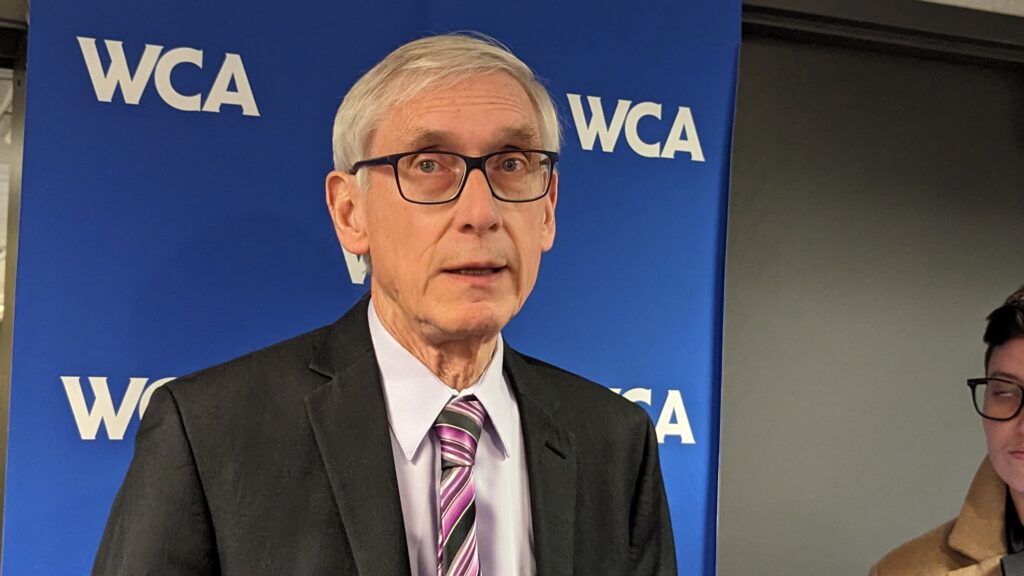Evers Signs Bills Overhauling Alcohol Regulation, Driver Ed
Governor also vetoed a handful of election bills.

Gov. Tony Evers speaking with reporters at the Wisconsin Counties Association conference on Feb. 28, 2023. Photo by Baylor Spears/Wisconsin Examiner.
Gov. Tony Evers took action on a slate of 51 bills on Wednesday, including one that overhauls the state’s alcohol regulations, one to start funding drivers education and several election related bills.
Evers signed SB 268, which will update Wisconsin’s alcohol regulation. Now Wisconsin Act 73 , the legislation overhauls the state’s “three-tiered system” and loosens some restrictions for breweries and wineries, including by allowing brewpubs to increase the amount of beer they can produce. The statute will also create a dedicated division at the Department of Revenue for the regulation of the industry and create a statewide bartender license.
“Across the country, Wisconsin is best known not only for our world-champion dairy but also our world-class breweries, wineries, and distilleries that employ thousands of workers statewide and play a significant role in our statewide economy. Ensuring that our state’s regulations and policies are modernized and updated to meet this ever-evolving industry remains a priority for the safety of consumers, producers, and Wisconsin as a whole,” Evers said in a statement.
The legislation drew objections from operator’s of “wedding barns” across the state because it will require those businesses to obtain a liquor license or apply for special event permits to hold weddings, after years of being mostly unregulated. The businesses will be limited to six events per year and not more than one event per month. The bill includes a two-year delayed effective date for wedding barns and similar establishments.
Evers signed AB 394, now 2023 Wisconsin Act 86, which directs the Department of Transportation to establish a driver education grant program. The aim of the program is to help increase access to driving for low-income students and increase road safety.
“Ensuring young drivers have access to the resources and education they need to gain experience and learn to drive safely is critically important for the safety of our roads and the well-being of communities across our state,” Evers said.
The state of Wisconsin hasn’t funded drivers’ education since 2004.
The grant program will be funded by $6 million that was set aside in the 2023-25 biennial budget. People under the age of 20 who are eligible for a free or reduced-price lunch in the federal school lunch program and are enrolled in a public, choice, charter or home school would be eligible to have costs covered.
Evers signed three election-related bills and vetoed three others.
Senate Bill 283, now Wisconsin Act 53, will require that if a municipality broadcasts election night proceedings, then video records of election will be retained for 22 months.
Senate Bill 433, now Wisconsin Act 54, modifies a requirement that presidential primary absentee ballots be sent at least 47 days beforehand to only apply to military and overseas voters. Other voters under the statute will be sent the presidential primary absentee ballot at least 21 days in advance. The bill is a change that was requested by clerks, who wanted to see requirements for different types of ballots didn’t overlapping.
Assembly Bill 335, now 2023 Wisconsin Act 52, will require any candidate found guilty of a campaign finance or election fraud Class 1 felony to dissolve their campaign committee and return unencumbered funds to donors.
Evers vetoed AB 396, which would have repealed the Wisconsin Elections Commission’s authority to establish fees for obtaining copies of the official voter registration list and prevented the price from exceeding $250.
Evers also vetoed AB 494, which would have specified that the “indefinitely confined” status can only be claimed by voters who “cannot travel independently without significant burden because of frailty, physical illness, or a disability that is expected to last longer than one year” and that an outbreak or epidemic of a communicable disease would not allow someone to qualify.
Republican lawmakers introduced the bill in reaction to fears that voters misused the status during the COVID-19 pandemic.
The bill would have also required voters seeking the status to fill out an application and provide photo identification, and implemented a penalty of $1,000 and up to six months in prison for those that falsely claim the status.
Evers said in his veto message that he objected to the way the bill targets certain voters and continues the Legislature’s ongoing efforts to “make it more difficult for eligible voters to vote.” He said the “indefinitely confined” status was developed to help aging and disabled voters exercise their constitutional right and that the bill substantially restricts the status with its narrow definition.
“I object to this bill requiring state-issued identification cards to have a ‘recognizable indication’ that could result in certain individuals being treated differently or unfairly in every day, nonelectoral situations this legislation fails to consider or contemplate,” Evers stated in his veto message.
Evers vetoed SB 98, which would have required that the Department of Transportation mark IDs of people who aren’t U.S. citizens with the phrase “not valid for voting purposes.” It also would have required that the DOT transmit certain information to WEC in order to verify citizenship status of voters.
Evers signed a bill, now Wisconsin Act 75, that establishes regulations for third-party food delivery services like Uber Eats and Doordash. He also signed a package of bills, now Wisconsin Acts 47, 48 and 49, that change how the Wisconsin National Guard addresses sexual assault and a bill, now 2023 Wisconsin Act 58, that establishes a six-month time limit for state crime laboratories to process sexual assault kits.
Gov. Evers takes action on alcohol regulation, drivers ed and election bills was originally published by the Wisconsin Examiner.






















“who wanted to see requirements for different types of ballots didn’t overlapping.”
what is that supposed to say/mean?